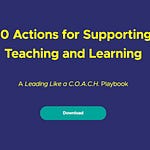
Below are five insights after I read ten thoughtful posts from contributors around my book, Leading Like a C.O.A.C.H.
1. Leaders need to know literacy.
“Through a lifetime of working in schools, one of my most powerful insights and core beliefs is that teachers must be leaders, and principals must know literacy.” (pg. 1)
- Regie Routman, Read, Write, Lead: Breakthrough Strategies for Schoolwide Literacy Success (ASCD, 2014)
School leaders knowing literacy should go without saying. But a question I have here is, why don’t more leaders - especially principals - know literacy?
My initial thinking was, literacy continues to lack consensus on what makes instruction effective. You can see it in confrontational conversations online around the science of reading. I can understand why few leaders want to join these discussions when the apparent goal of too many is to be right vs. to listen and learn.
But I think there’s more to it, a deeper reason for this challenge of consensus.
Taking a more holistic perspective, a) literacy is a complex discipline and b) we are not embracing it for its complexity. Instead, we resort to simple stories about best practices for teaching readers and writers because they are easier to understand and share, especially when writing hot takes on Twitter. How do we hold these tensions in our minds and help our faculty and colleagues do the same?
I don’t have immediate answers to this issue, but it is something I am working on professionally (see the end of this post for an opportunity to join me).
In the meantime, I continue to appreciate the questions that surface from not knowing, such as Jamie Cicconetti’s wondering, “What point am I even trying to make in exposing my messy process of a professional writing post?”, as she reflects on trying to create clarity from her learning in the post below.


2. Leaders will always need to attend to trust.
The sheer number of book study posts around trust says so much about its importance.








Rhonda Precourt, Paige Bergin, Carrie Thomas, Genevieve Arcovio, and Ryanne Deschane each wrote eloquent and personal accounts of the importance of this element for a successful school literacy culture. Without trust, the school system stops operating like it should. It is the “lubricant of organizational functioning” (Tschannen-Moran, 2014)
As a leader I have learned that to keep trust high, I have to attend to things beyond just a strong literacy initiative, such as:
How well are teams working together?
Do staff and faculty feel appreciated?
Am I following through on my commitments?
This takes effort, intention, and an awareness of the level of trust in the school.
That said, literacy can also be a vehicle for building and sustaining trust, such as by committing funds to purchasing books for classroom libraries.
3. Leaders who are clear on the school’s priorities make better decisions.
When the collective attention is on a clear priority, it becomes easier to lead.
A big part of prioritization is not just in having a focus, but in being able to ignore other options.
And in education, there are always options. I would lose track of word count in this post if I waded into the alphabet soup of acronyms and initiatives.
By committing to one thing, we naturally decline many other things, at least as a primary focus. I have found it reduces stress in the school culture while helping faculty commit to the priority.
I thought Heather McKay summed this idea up well in her post.


4. Any type of feedback is better than no feedback.
In my research for the book, I discovered surprising findings about feedback.
For example, one study found that the most effective feedback was noticing and naming teachers' practices they were already doing well. This was followed in effectiveness by more traditional feedback that focused on areas of improvement. As expected, no feedback had the least amount of influence.
What this led me to believe, affirmed by Tyler Keener's and Jen McDonough’s posts below, is teachers benefit from any type of feedback, even if we are wrong.
In other words, leaders need to prioritize time in classrooms.
5. Leaders need a systems approach to focus on what matters.


As Annie Palmer points out in the above post, teachers need to see the “why” for the work.
A challenge here is how to connect these chess pieces - trust, prioritization, support, feedback, etc. - so that the vision is clear and feels doable.
What I have learned is that so much that goes into effective leadership, especially decision-making, is largely based on how well we manage our days. For example, what is our process when a teacher makes a request to purchase a literacy curriculum resource? How is the process aligned with our school’s shared beliefs? Who should be involved in the decision-making? What is the best way to communicate a response?
This is just one example. There are many more leadership tasks that would benefit from a systems approach, such as:
How can I carve out time to get into classrooms on a daily basis?
How do I develop my identity as a coach and expand beyond the traditional leadership role?
What steps can I fall back on when looking to engage teachers in coaching conversations?
How might I rethink my environment to better support this work?
What routines can I use to affirm what teachers are doing well, plus communicate feedback on potential areas for growth?
These are questions I may be exploring more here and in a new community space.
Sign up below and stayed tuned for a follow up post about how this space can support your efforts to lead literacy in your school, from wherever you are.
Matt Renwick has served in public education for over 20 years. He started as a 5th and 6th-grade teacher in a country school outside of Wisconsin Rapids, WI. Matt now serves as an elementary principal for the Mineral Point Unified School District.
Matt is the author of three books: 5 Myths About Classroom Technology: How Do I Integrate Technology to Truly Enhance Learning? (ASCD, 2016), Digital Portfolios in the Classroom: Showcasing and Assessing Student Work (ASCD, 2017), and Leading Like a C.O.A.C.H.: Five Strategies for Supporting Teaching and Learning (Corwin, 2022).
He also writes publicly on Twitter (@ReadByExample) and on this newsletter.












Share this post